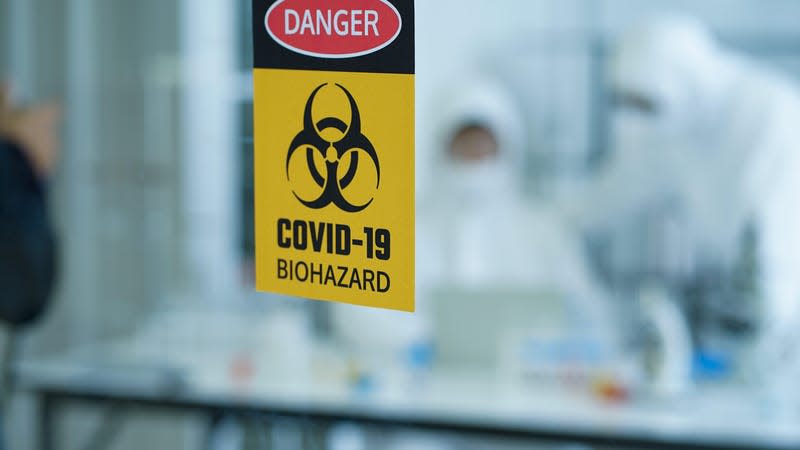U.S. Funded Scientist One of Several Wuhan Lab Researchers Sickened During Early Covid Outbreak

- Oops!Something went wrong.Please try again later.
In November of 2019, less than a month before the covid-19 pandemic took off and spread to nations all over the world, several scientists working at the Wuhan Institute of Virology in China fell seriously ill from an unknown virus. One of the researchers was Ben Hu, a scientist who had received significant funding from the U.S. government and whose research has focused on “how coronaviruses infect humans,” new reporting by the Wall Street Journal shows.
At WIV, Hu was responsible for overseeing “gain of function” research—the controversial scientific field that involves mutating viruses to make them more deadly and more contagious—involving coronaviruses. Gain-of-function research, which was banned in the U.S. until 2017, is typically used to develop vaccines. Hu and other scientists—which have now been identified as Chinese researchers Yu Ping and Yan Zhu—were sickened by...something...in the fall of 2019 while working at the lab. It is unclear exactly what made Hu and other researchers ill. The Journal writes that the trio were sickened by “symptoms that American officials said were consistent with either Covid-19 or a seasonal illness”—to the point where the men had to be hospitalized—but notes that it has not been definitively made public what caused the symptoms. Still, we can all agree that doesn’t sound great.
Read more
The illnesses had previously been reported on in 2021, when the Journal broke a story about researchers becoming sick at the Wuhan lab; the story was based on information received by U.S. intelligence but did not identify who had been impacted. The identities of the affected researchers remained a mystery until last week, when Public and Racket, two blogs on Substack, published a story about the incident. The story claims:
According to multiple U.S. government officials interviewed as part of a lengthy investigation by Public and Racket, the first people infected by the virus, “patients zero,” included Ben Hu, a researcher who led the WIV’s “gain-of-function” research on SARS-like coronaviruses, which increases the infectiousness of viruses.
Details about Hu and others’ research was also recently revealed by a transparency advocacy organization known as White Coat Waste Project. The project previously filed a Freedom of Information Act lawsuit against the government in order to pry loose documents detailing the U.S.’s funding of research that went on at the Wuhan Institute of Virology. The documents reveal details of the grants that were used to fund the researchers work at WIV until 2020, when President Trump shut down funding for the experiments.
According to WCW, one of the distributors of grant funding for Hu’s research was the U.S. Agency for International Development, while the other—and this is a twist that is sure to prove contentious—was the National Institute of Allergy and Infectious Diseases (NIAID), the agency that was formerly headed by Dr. Anthony Fauci. Fauci served as the director of the NIAID for over two decades, beginning in 1984. He stepped down from his leadership position at the agency at the end of last year. Alternately the object of liberal adulation and rightwing conspiracy theories, Fauci served as a prominent figure in the public conversation around covid-19, and it stands to reason that his former agency’s involvement won’t go unnoticed here.
Altogether, the documents and the new reporting raise more questions than they answer—only serving to deepen the mystery around the origins of the worst pandemic in living memory. During the early days of covid, scientists rallied around zoonotic transmission as the most likely cause of the virus, with high-placed public health officials claiming it likely originated in the more unsanitary regions of a Wuhan wet market—perhaps via the human consumption of a pangolin or another animal. Meanwhile, speculations about covid having escaped from a lab or being the result of bioengineering were reflexively written off as the terrain of cranks and conspiracy theorists. As time passed, however, this conversation has notably shifted. Today, the “lab leak” hypothesis seems increasingly likely. Some government agencies have even admitted that they think it’s the most plausible explanation for how the virus started. Evidence for zoonotic transmission, meanwhile, has not been concretely borne out; researchers have failed to trace the virus to a particular animal.
We should hopefully know more soon. The U.S. intelligence community is obligated to declassify the information it possesses regarding potential links between the Wuhan lab and the origins of covid-19. A bill signed into law by President Biden in March mandated the declassification no later than this week.
More from Gizmodo
Sign up for Gizmodo's Newsletter. For the latest news, Facebook, Twitter and Instagram.

